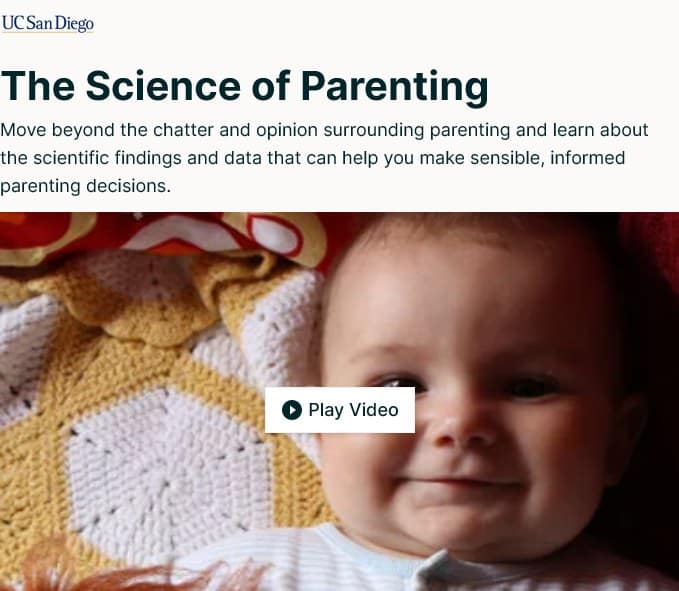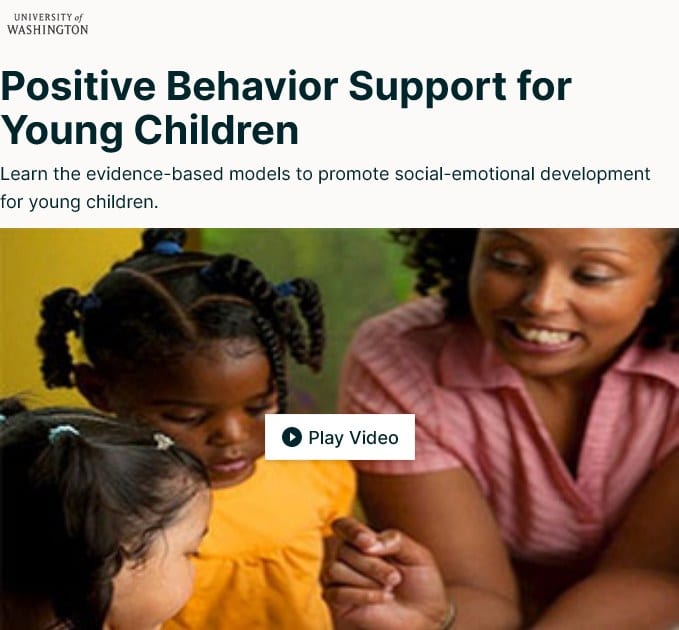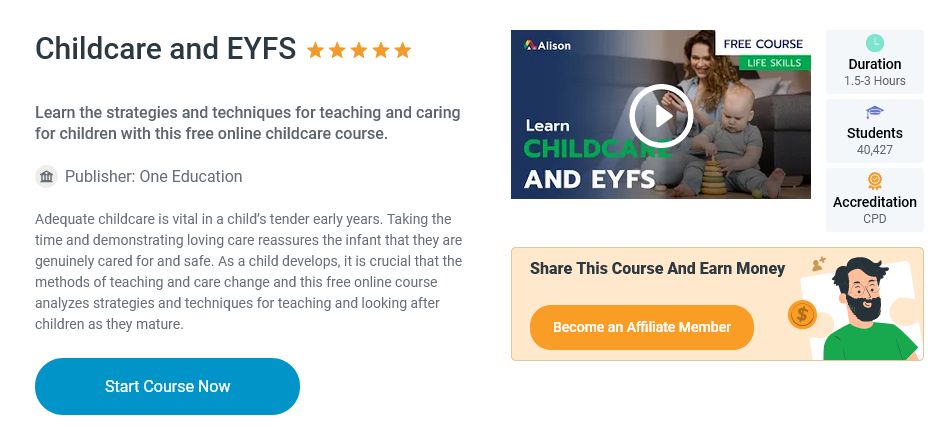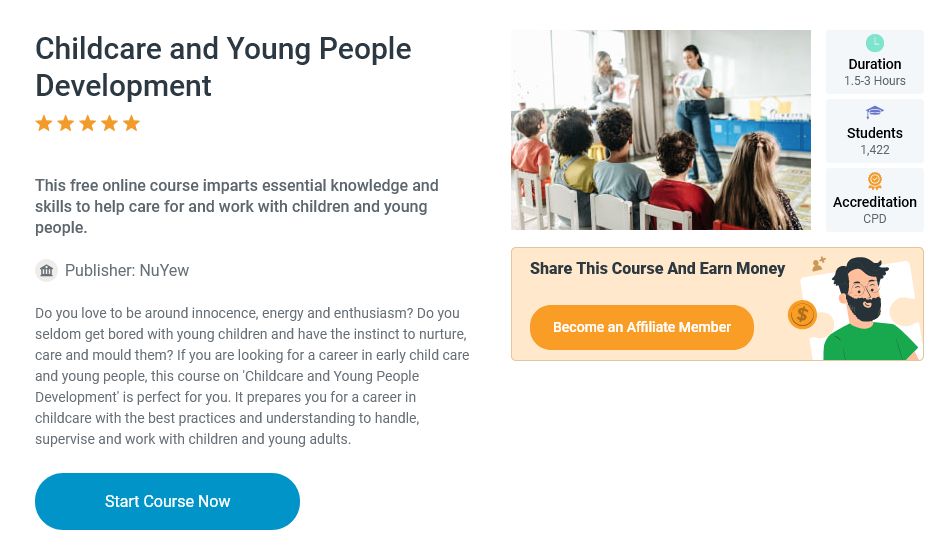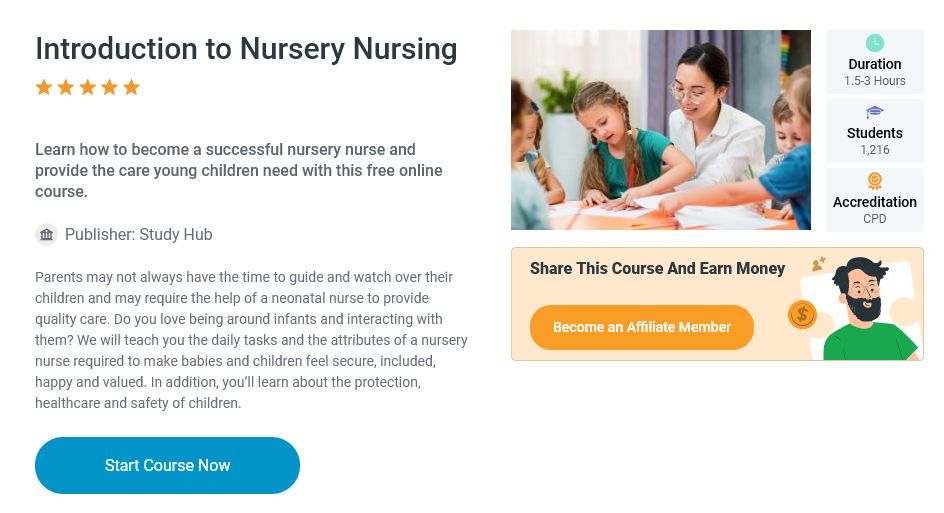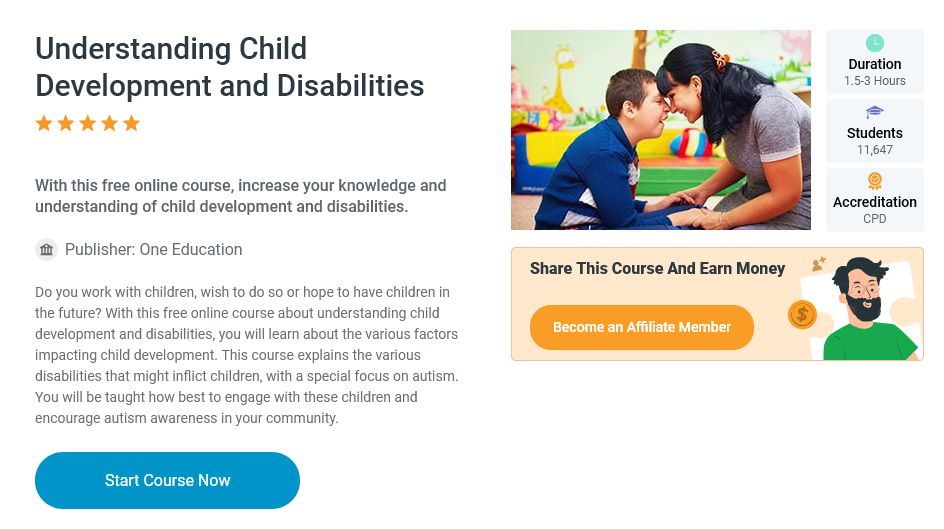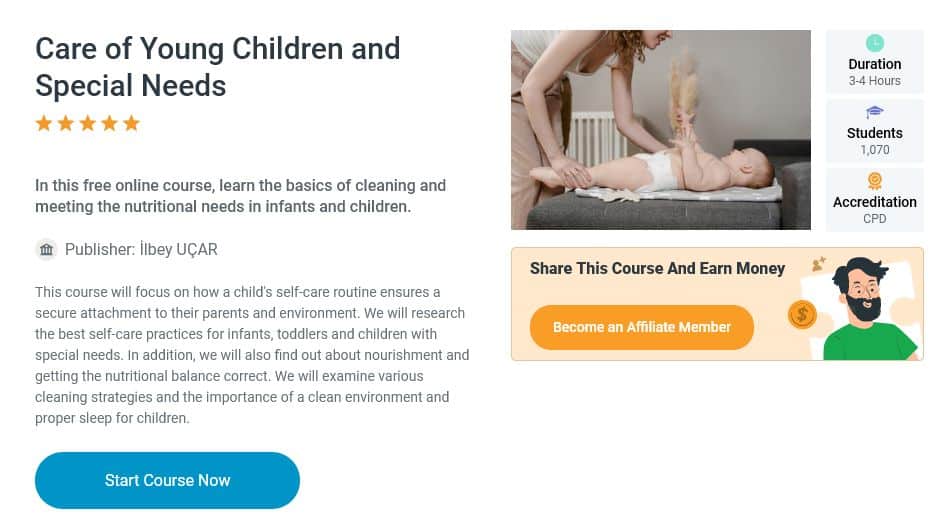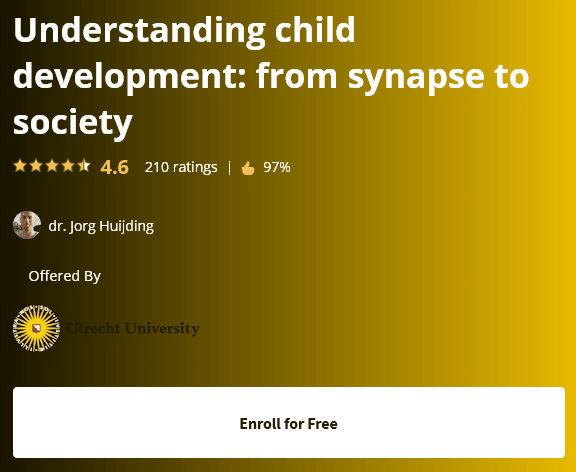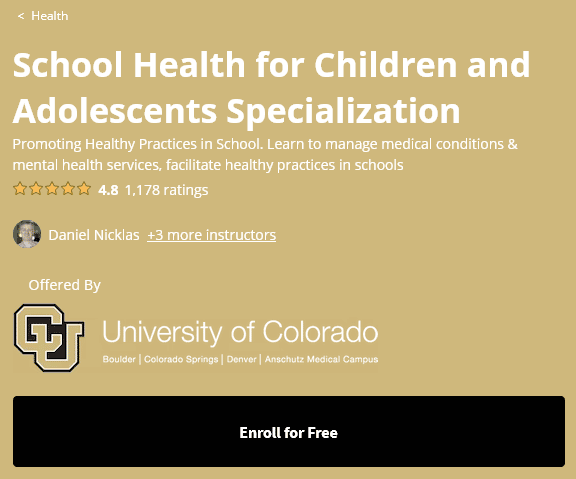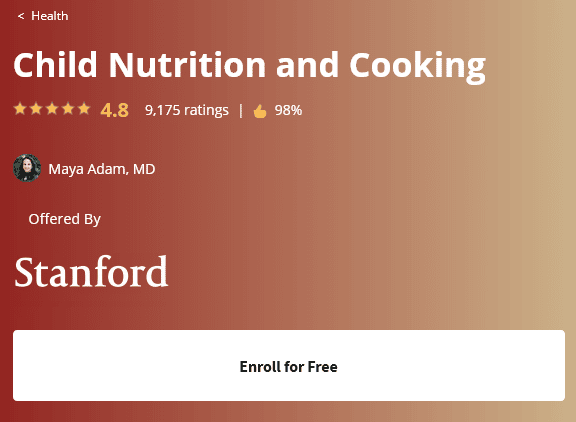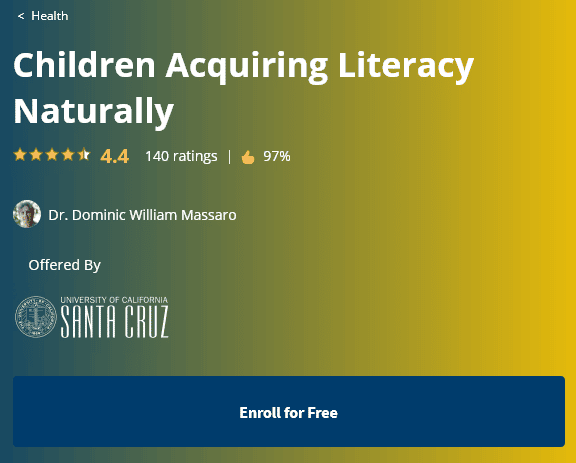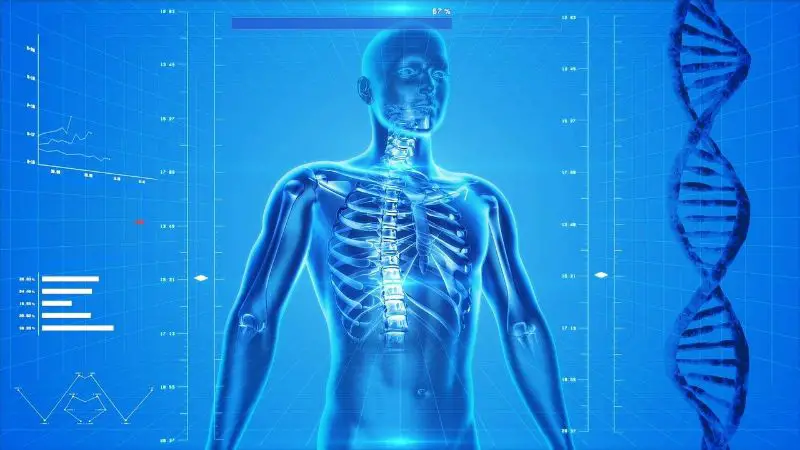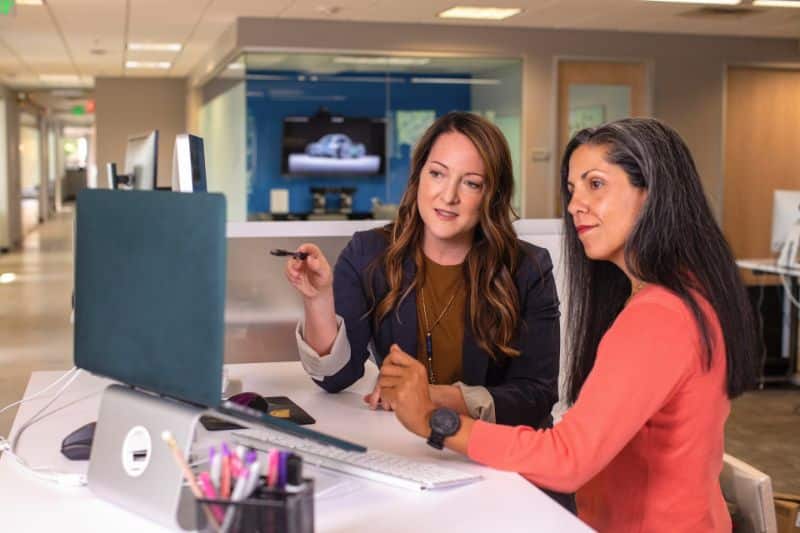Whether you’re a parent looking to brush up on your childcare skills or a new caregiver seeking professional development, there are plenty of free online courses available to help you out. On this page, we’ll explore some of the best free online childcare courses currently offered.
Whether you’re interested in learning about child development, safety, nutrition, or caring for children with special needs, there’s sure to be a course that’s right for you. So if you’re ready to get started learning more about how to care for children, read on!
Table of Contents
Free Online Courses Childcare
The Science of Parenting – UCSanDiego
The Science of Parenting is a free online childcare course offered by UCSanDiego, and it can help parents learn about the latest research on child development and how it can be applied to their own children.
This course covers a range of topics, from the nature vs. nurture debate to how to deal with difficult behaviors. The course is divided into five weeks, each covering a different topic.
In week one, students will learn about the nature vs. nurture debate and how genetics can impact child development.
Week two covers topics such as learning language, screen time, preschool, and music.
In week three, students will learn about morality, self-control, and family structure.
Week four covers autism and vaccination, sleep, diet, and breastfeeding.
In week five, students will learn about learning styles and homeschooling.
The course is comprehensive and well-researched, and it offers a variety of perspectives on each topic. Moreover, the course is free and can be taken at your own pace.
If you are looking for a reliable source of information on childcare, the Science of Parenting is definitely worth checking out.
Positive Behavior Support for Young Children – University of Washington
The University of Washington’s Positive Behavior Support for Young Children course offers intensive, evidence-based strategies for dealing with almost any problem. In addition to learning about effective techniques for managing difficult behavior, participants will also have the opportunity to reframe their own thinking in challenging situations.
By the end of the course, caregivers will be better equipped to foster social-emotional competence in young children and reinforce peaceful problem-solving techniques.
And best of all, the course is offered entirely online for free, and it’s convenient and easy to access.
When I Grow Up: Supporting Children’s Aspirations
The free online course When I Grow Up: Supporting Children’s Aspirations will help you understand the importance of a child’s hopes and dreams and how to support children as they develop their own aspirations for their future.
The course is delivered over four weeks, with each week focusing on a different aspect of aspiration development.
Week one provides an introduction to aspirations and why they are important.
In week two, you will learn about the education and career aspirations of young people.
Week three covers the factors that influence aspiration formation.
And in week four, you will explore the role that parents, families, schools, and communities play in shaping aspirations.
By the end of the course, you will have a better understanding of how to support children as they plan for their future.
Child Care – Health and Safety
Child Care – Health and Safety is a free online childcare course that explores how to take care of children at different stages of their development. The course will cover topics such as how to fulfill children’s needs, give them the right food and environment to grow, protect them against abuse and neglect, and how to encourage constructive learning and experiences.
Understanding Children’s Needs
In this part of the course, you will explore how to understand the needs of children. We will look at the physical, emotional, social, and intellectual needs of children and how they change as they grow. You will also discuss the importance of providing a safe and healthy environment for children to grow up in.
Giving Children the Right Food and Environment to Grow
In this part of the course, you will explore how to give children the right food and environment to grow. You will look at the different types of food that children need at different stages of their development, as well as how to create a safe and healthy environment for them to grow up in.
Protecting Children Against Abuse and Neglect
In this part of the course, you will explore how to protect children against abuse and neglect. The instructor will also discuss different types of abuse and neglect, as well as what you can do if you suspect that a child is being abused or neglected.
Encouraging Play for Learning and Experience
In this part of the course, you will explore how to encourage play for learning and experience. You will also learn more about the importance of play in child development, as well as different types of games and activities that can help children learn and experience new things.
Childcare and EYFS
Childcare and EYFS analyzes strategies and techniques for teaching and looking after children as they mature. In it, you will learn about preventative safety measures, abuse and neglect signs, special needs instruction, and much more. After completing this course, you will be better equipped to provide the high-quality care that every child deserves.
Childcare and Young People Development
Childcare and Young People Development covers all of the key elements of childcare, including the different stages of development in children, the personal and professional qualities needed for a successful career in childcare, and the legal responsibilities and procedures involved in safeguarding children.
The course will cover the following topics:
- Childcare with all its elements and roles.
- Personal and professional requirements needed for a career in the childcare sector.
- How to handle various behavioral problems with children and young people.
- Patterns of development in children and young people.
- How to communicate, maintain and support children and young people
This free online course is an excellent introduction to childcare for those interested in pursuing a career in this field or for parents who want to better understand the developmental needs of their children. By understanding all the key elements covered in this course, you will be able to provide quality care that meets the individual needs of each child.
Introduction to Nursery Nursing
Introduction to Nursery Nursing is an online childcare course that covers a variety of topics related to childcare. The course is designed for those who are interested in working with children in a nursery setting.
The course is split into four modules, each of which covers a different topic.
Module 1 covers the role of the nursery nurse and child support. Module 2 covers observation and growth, module 3 covers equality and child protection, and module 4 covers food and special needs.
Each section includes practical activities, such as role-play scenarios, as well as information on key policies and legislation. Throughout the course, you will have the opportunity to reflect on your own practice and consider how you can make a positive difference in the lives of the children in your care.
Understanding Child Development and Disabilities
Understanding Child Development and Disabilities covers a range of topics related to children’s development and well-being. The course is divided into three main sections:
In the first section, you will learn about different aspects of child development, including physical, cognitive, social, and emotional development. You will also explore different theories of child development and find out about developmental milestones.
In the second section, you will gain an understanding of different types of early years provision, including daycare, Nursery schools, and Montessori schools. You will also learn about the benefits and drawbacks of each type of provision.
In the final section, you will discover more about children with special needs, including those with autism spectrum disorder (ASD). You will explore different approaches to ASD diagnosis and treatment and find out about the support that is available for families who have a child with ASD.
Care of Young Children and Special Needs
The Care of Young Children with Special Needs Online Course is designed to help you understand the different self-care skills that are important for early childhood development. The course will cover topics such as cleaning, dressing, nutrition, toilet training, and gaining independent life skills.
Understanding child development: from synapse to society
In this course, Understanding child development: from synapse to society, you will learn about the following topics:
Understanding Child Development: From Synapse to Society
This section of the course covers the different stages of child development, from brain development to social-emotional development. You will learn about the importance of each stage of development and how you can support a child during each stage.
Dynamics of Youth
This section of the course will focus on adolescence, which is typically defined as the period between childhood and adulthood. Adolescence is a time of great change, and this section of the course will help you navigate those changes.
Brain and Motor Development
In this section of the course, you will learn about brain development and motor skills development. You will also learn about how the brain develops during childhood and adolescence and how this affects a child’s ability to learn new skills. You will also learn about gross motor skills and fine motor skills and how they develop over time.
Cognitive Development
This section of the class will focus on cognitive development, which is the process by which children learn to think, reason, and remember. You will learn about different theories of cognitive development and how they apply to real-life situations.
Communication
This section of the course will focus on communication skills. You will learn about different types of communication ( verbal, nonverbal, written) and how children develop these skills over time. This section will also discuss ways that you can support a child’s communication skills through activities like modeling appropriate verbal behavior or encouraging them to express their feelings in words.
School Health for Children and Adolescents Specialization
The School Health for Children and Adolescents Specialization is a four-course specialization that is designed for childcare providers who want to improve their knowledge and skills in order to provide better care for children with special health needs.
The courses cover a range of topics, including managing asthma, allergies, diabetes, and seizures; managing ADHD, autism, learning disabilities, and concussion; providing social, emotional, behavioral, and special education services; and promoting healthy practices such as nutrition, physical activity, community, and family.
Course 1: Managing Asthma, Allergies, Diabetes, and Seizures in School
This course will teach you how to effectively manage the care of children with asthma, allergies, diabetes, and seizure disorders in a school setting. You’ll learn about the signs and symptoms of each condition, as well as how to create individualized care plans and work with families to ensure that all children have the best possible outcomes.
Course 2: Managing ADHD, Autism, Learning Disabilities, and Concussion in School
This course will help you manage the care of children with ADHD, autism spectrum disorder, learning disabilities, and concussions in a school setting. You’ll learn about the signs and symptoms of each condition, as well as how to create individualized care plans and collaborate with families to promote positive outcomes.
Course 3: Providing Social, Emotional, Behavioral, and Special Education Services in School
This course will provide you with the skills and knowledge necessary to effectively provide social-emotional support for all students in a school setting. You’ll learn about a variety of evidence-based strategies for promoting positive behavior and supporting students with special needs. In addition, you’ll have the opportunity to practice these skills through simulations and case studies.
Course 4: Healthy Practices: Nutrition, Physical Activity, and Community Engagement
In this course, you will explore the importance of nutrition, physical activity, and community engagement in promoting child health. You’ll learn about ways to incorporate healthy eating habits into your school’s curriculum and create opportunities for physical activity throughout the day. In addition, you’ll examine ways to involve families and community members in supporting student health.
Child Nutrition and Cooking
Stanford’s Child Nutrition and Cooking provides child care professionals with the information they need to teach children about healthy eating habits and how to cook simple, nutritious meals.
The course is four weeks long and covers the following topics:
Why Home Cooking Matters
In this section of the course, you will explore the importance of home cooking in child nutrition. You will learn about the benefits of cooking at home, such as teaching children where their food comes from and how it is prepared. You will also explore the many ways that home-cooked meals are more nutritious than processed foods.
What Constitutes a Balanced Meal?
In this section of the course, you will explore what makes up a balanced meal. It covers the different food groups and why it is important for children to eat a variety of foods from each group. It also talks about portion sizes and how to ensure that children are getting the right amount of food at each meal.
From Supermarket to Dinner Table to School
This week you will learn how to choose healthy ingredients when shopping for groceries. In addition, you’ll also get to try out some simple recipes that can be made with those ingredients. Finally, you will explore ways to incorporate healthy eating into school lunch programs.
Sustainable Eating
In the final week of the course, you will go over sustainable eating practices and the importance of buying locally sourced and organic foods when possible. Plus, you will learn about the ways to reduce food waste in the home kitchen.
Children Acquiring Literacy Naturally
Children Acquiring Literacy Naturally focuses on how children acquire reading and writing skills. It is aimed at childcare providers, educators, and parents who want to better understand how children learn to read and write.
In the introduction, you will learn about some of the challenges in teaching literacy skills to children. Plus, you will get a brief overview of the importance of language development in early childhood.
Acquiring Spoken and Written Language
This section of the course will focus on how children acquire spoken and written language. You will also learn about the different theories of language acquisition and how they can be applied in the classroom or at home.
Reading, Early Reading, and Technological Innovations
Finally, you will learn about early reading skills and how to encourage a love of reading in young children. This is then followed up with some of the latest technological innovations in the field of literacy instruction.
If you are interested in learning more about how to help children acquire literacy skills, then this free online course is for you! This course takes approximately three weeks to complete and is suitable for childcare providers, educators, and parents alike.


